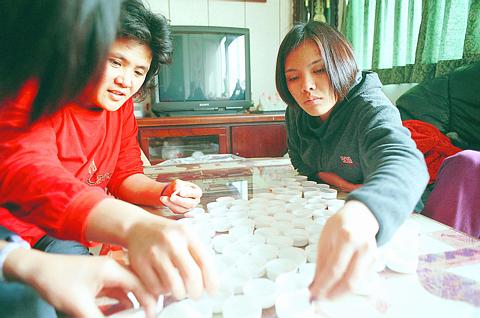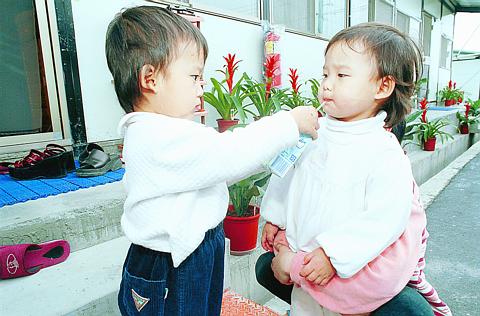"The holidays will still be holidays, it's just that this year, it will be a little harder," said Mr Yu, sitting in the main room of the prefabricated structure that he now calls home.
On a quiet afternoon earlier this week, Yu and his family -- his wife and two daughters -- were busy working in their "home factory," skillfully inserting pieces of circular-shaped paper into caps meant for medicine bottles.
Yu said the family has been doing piecework for two months, receiving three New Taiwan cents for each piece completed.

PHOTO: GEORGE TSORNG, TAIPEI TIMES
"It's not big money, but it helps toward our grocery expenses," he said.
At Aiping New Village (
Many families finish 20,000 of the caps per day, according to Yu.

PHOTO: GEORGE TSORNG, TAIPEI TIMES
Cottage-industry piecework throve during the 1960s and 1970s, when Taiwan was a major OEM producer for toys, shoes and accessories. At that time, many housewives and their children would assemble toy parts and perform other simple tasks as part the "informal sector" of Taiwan's labor force. These people were an indispensable part of Taiwan's "economic miracle."
Now such manual labor -- which has since declined -- is being taken up once again by residents of central Taiwan affected by last year's 921 earthquake.
"After the quake, most of us [residents of the village] shouldered huge mortgages, so we all need to work to make extra money," said Chang Hsien-ying (張仙英), the director of the Aiping resident's committee.
Chang said he had heard that one woman living in the community had done piecework before the earthquake, so he arranged with her to contact manufacturers.
Meanwhile, he said, the community's residents are also preparing to fight a lawsuit against a property developer who built their previous homes. This also meant a need for extra work, Chang said.
Aiping New Village is mostly composed of former residents of Taiping Hsinping Life Park (
The collapse of the building took 16 lives and left more than 200 people homeless. Residents said the collapse was the result of shoddy construction, not the quake.
"The government is not [taking care of people's lives], so we are doing it ourselves," Chang said.
Former residents said Lin is expected to be indicted on charges of faulty construction by district prosecutors after the Chinese New Year.
Mrs Yu wakes up at 3am every morning and begins work by delivering goat's milk for a local dairy. She finishes her deliveries around 6am, takes a short nap, and then heads to her second job, as an assistant at a lunchbox kitchen.
After dinner, she and her husband, a self-employed contractor, call their children together to start their piecework session. She said this year, despite the setbacks they have faced, her children's red envelopes will not contain less money than in past years.
Another resident, Lee Chiu-lien (李秋蓮) works equally as hard. Her home -- which she had still been paying for after 10 years as a factory worker -- collapsed during the earthquake, leaving her with a debt of NT$3 million.
She has also taken up piecework. As she talked, she injected a mix of water and glitter into plastic tubes to make decorative accessory rings. She said she can make 1,000 pieces per day.
"All I had hoped for was to have a home. Now that this hope is gone, I have to start from scratch again," she said.
Lee was recently laid off from her previous post-quake job as a salesperson at a clothing store because she had frequently asking for leave to join in victims' demonstrations in Taipei.
"I know we should live by having faith in life, but sometimes it's very, very hard for me," said Lee.
The Aiping community is, however, planning to set up a self-help kindergarten in one of the prefab buildings, and Lee said she would also take a job there as a teacher.
Chang Hsien-ying, who organizes the child-care programs in the community, has been busy lately working to settle all such job opportunities for residents. He also plans to set up a children's playground near the houses.
"In three months, the community will finally have an enclosing wall. Drains will also be installed with covers, and we will have a volunteer patrol team to ensure security in the neighborhood," he said.
The temporary housing area has already been hit by thieves. Several accidents have also occurred when children tripped and fell in the still-uncovered gutters, he said.
"We want to be the best-developed community among all the temporary housing communities," Chang said.
"We want people to know that we are not just waiting here for the government's relief money; we also work very hard to rebuild our homes," he added.
In the small community office, volunteers were busy photocopying stacks of documents, including information on the government's relief guidelines, newly-passed reconstruction laws, and questionnaires on residents' views toward the lawsuit against the developer.
Yu's daughters and other community kids helped out, meanwhile, by putting copies of the documents into envelopes bearing the names of the residents of the collapsed complex.
"This is our weapon for the next round of the reconstruction battle," said a volunteer.
The children playing hide-and-seek in the grounds of the decommissioned military camp where they now live, appeared unaware that this year's Chinese New year is inextricably linked with the long road to reconstruction.
"But the New Year will still be celebrated, and a big New Year dinner will still be prepared," said Mrs Yu.

TRAGEDY STRIKES TAIPEI: The suspect died after falling off a building after he threw smoke grenades into Taipei Main Station and went on a killing spree in Zhongshan A 27-year-old suspect allegedly threw smoke grenades in Taipei Main Station and then proceeded to Zhongshan MRT Station in a random killing spree that resulted in the death of the suspect and two other civilians, and seven injured, including one in critical condition, as of press time last night. The suspect, identified as a man surnamed Chang Wen (張文), allegedly began the attack at Taipei Main Station, the Taipei Fire Department said, adding that it received a report at 5:24pm that smoke grenades had been thrown in the station. One man in his 50s was rushed to hospital after a cardiac arrest

SAFETY FIRST: Double the number of police were deployed at the Taipei Marathon, while other cities released plans to bolster public event safety Authorities across Taiwan have stepped up security measures ahead of Christmas and New Year events, following a knife and smoke bomb attack in Taipei on Friday that left four people dead and 11 injured. In a bid to prevent potential copycat incidents, police deployments have been expanded for large gatherings, transport hubs, and other crowded public spaces, according to official statements from police and city authorities. Taipei Mayor Chiang Wan-an (蔣萬安) said the city has “comprehensively raised security readiness” in crowded areas, increased police deployments with armed officers, and intensified patrols during weekends and nighttime hours. For large-scale events, security checkpoints and explosives

A car bomb killed a senior Russian general in southern Moscow yesterday morning, the latest high-profile army figure to be blown up in a blast that came just hours after Russian and Ukrainian delegates held separate talks in Miami on a plan to end the war. Kyiv has not commented on the incident, but Russian investigators said they were probing whether the blast was “linked” to “Ukrainian special forces.” The attack was similar to other assassinations of generals and pro-war figures that have either been claimed, or are widely believed to have been orchestrated, by Ukraine. Russian Lieutenant General Fanil Sarvarov, 56, head

PUBLIC SAFETY: The premier said that security would be tightened in transport hubs, while President Lai commended the public for their bravery The government is to deploy more police, including rapid response units, in crowded public areas to ensure a swift response to any threats, President William Lai (賴清德) said yesterday after a knife attack killed three people and injured 11 in Taipei the previous day. Lai made the remarks following a briefing by the National Police Agency on the progress of the investigation, saying that the attack underscored the importance of cooperation in public security between the central and local governments. The attack unfolded in the early evening on Friday around Taipei Main Station’s M7 exit and later near the Taipei MRT’s Zhongshan